|
16 Market Square

20 Market Square

Market Place
    
Dover
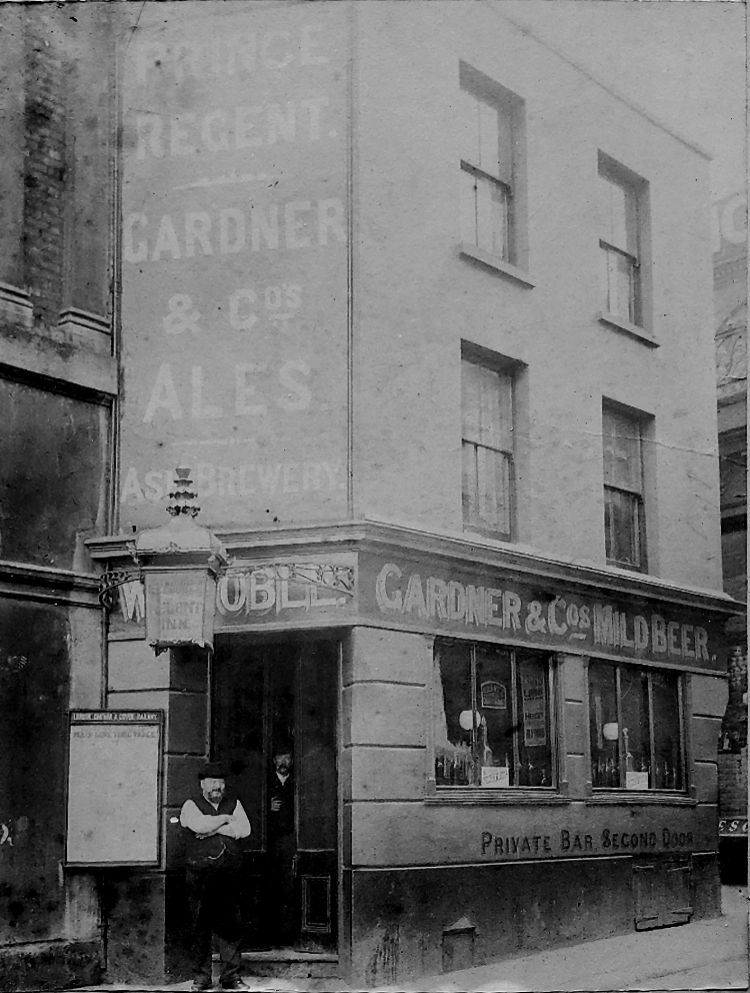
Above photo, circa 1891, with licensee William Frederick Doble standing
outside. Kindly sent by Wayne Moody. |
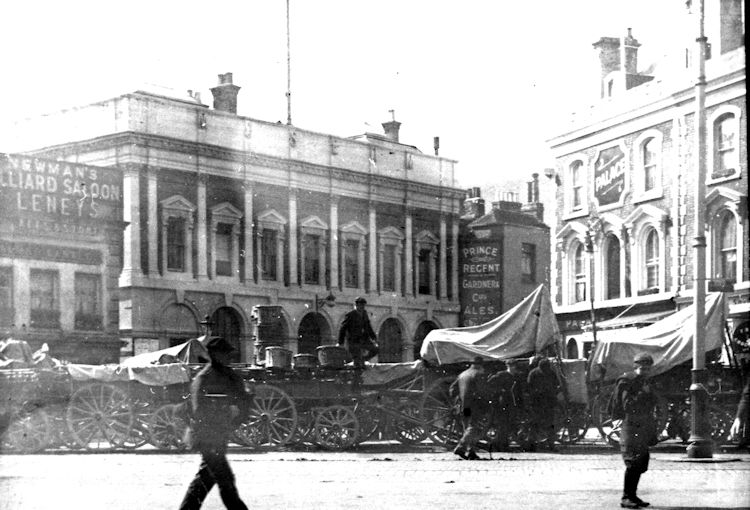
Above photo, 1910. Also showing the "Walmer
Castle" (left) and "Palace" (right). |
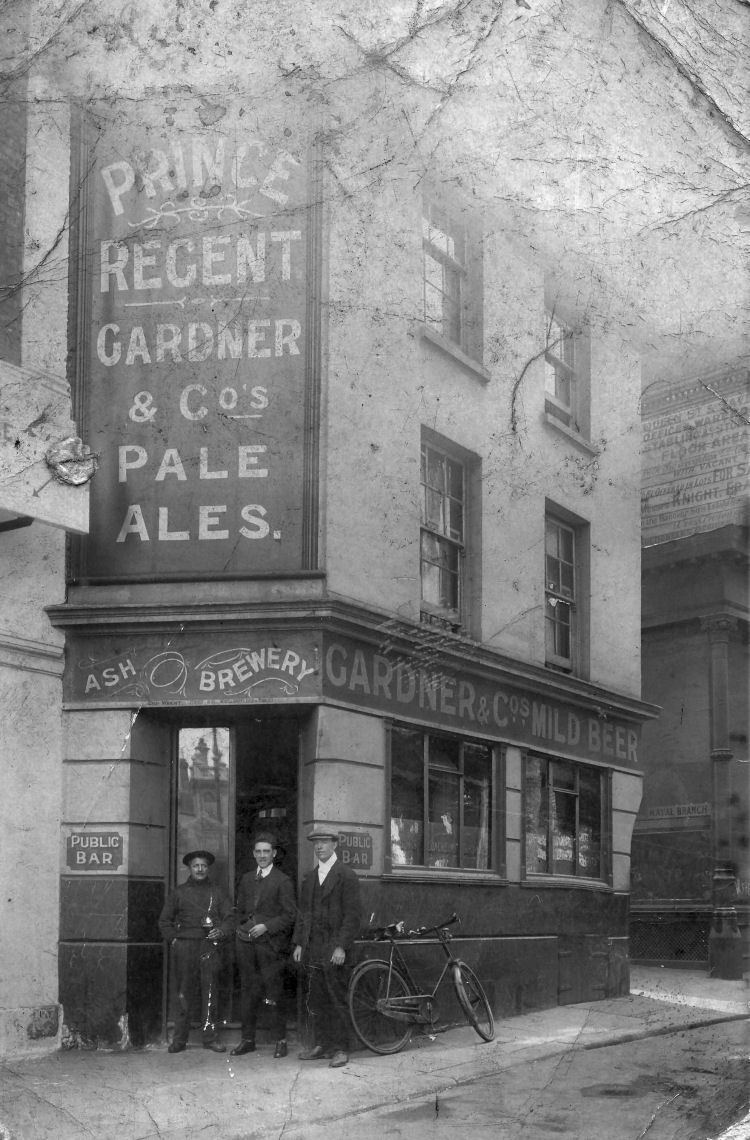
Mrs. Elva Chudley kindly sent me the above photo of the Prince Regent in
1926, the licensee name above the door is Chas. Wright. She says, "On
the right Fred Sims then I think Arthur Ives. The man on the left
unknown." |
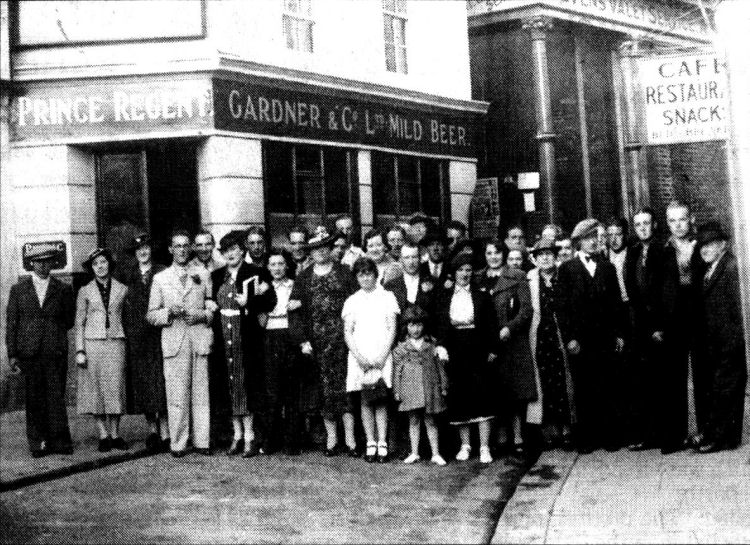
In this old photo of Dover Market, Joan Wheatley is the small child in
the front of the group taken outside the Prince Regent pub. Read her
story, "Click here".
Mrs. Elva Chudley says, "On researching my family history I came
across your web sit displaying a photo of the Prince Regent P.H. in
Market St. I was surprised to see several members of my family in the
group photo taken outside the Prince Regent P.H. It looks as if it is a
wedding photo, Frederick Sims and Gladys (nee Oram) my Grandparents are
on the far left. My Grandfather was stationed in Dover with the Royal
Signals where he met and married my Grandmother, Gladys Oram who was
born in Dover. I believe the bride may be Doris James (a local girl) who
married Arthur Ives my Grandfathers friend also in the Royal Signals.
Also spotted Gt. Grandmother Charlotte Geary (nee Oram nee Ward).
|
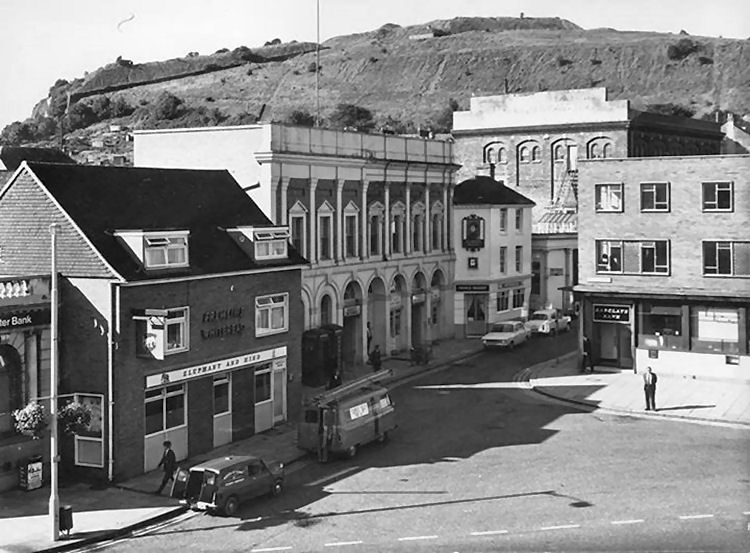
Above showing the "Prince Regent" centre, and the "Elephant
and Hind" right. |
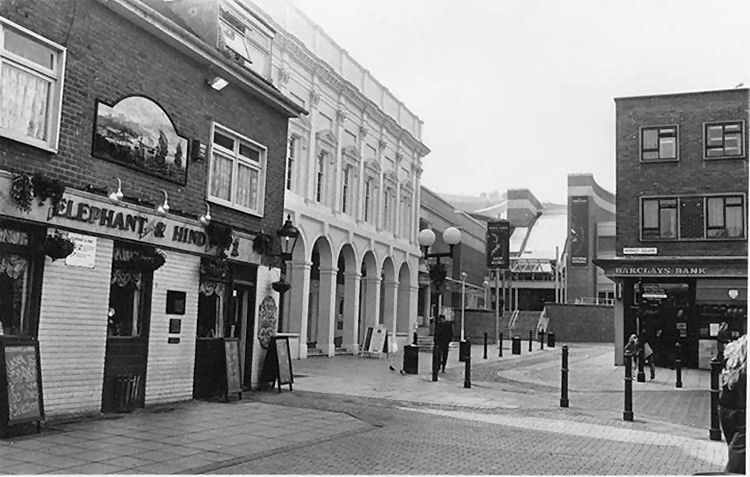
Above photo showing the same view after demolition of the "Prince
Regent." |
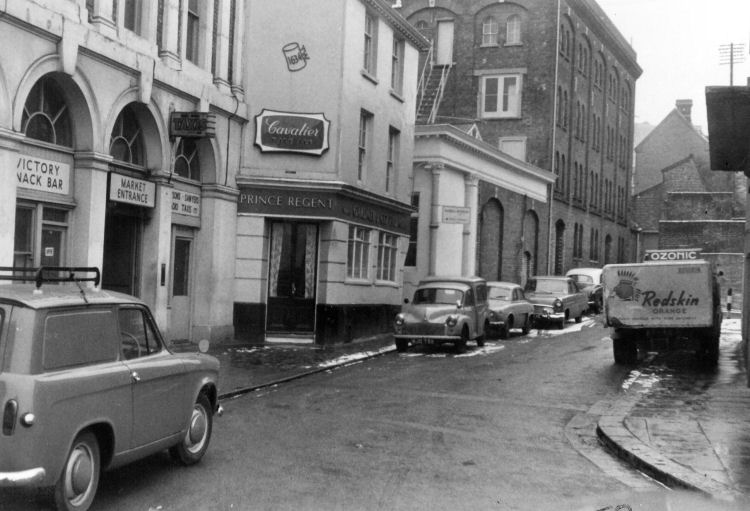
Above photo circa 1960, kindly supplied by Terry Wheeler of the Ramsgate
History Society. |
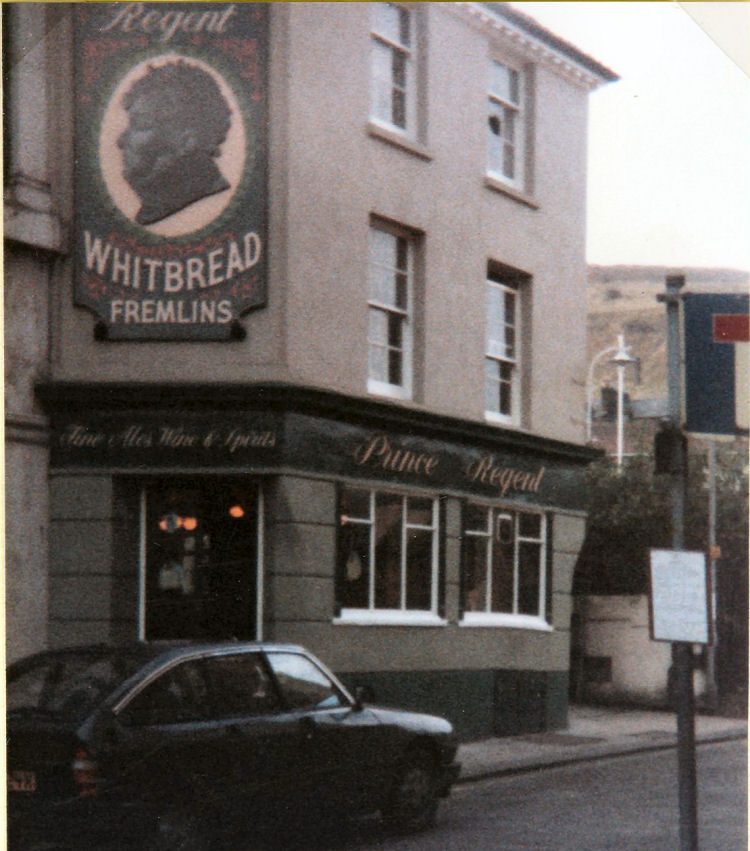 |
|
Above photo circa 1980 by Barry Smith. |
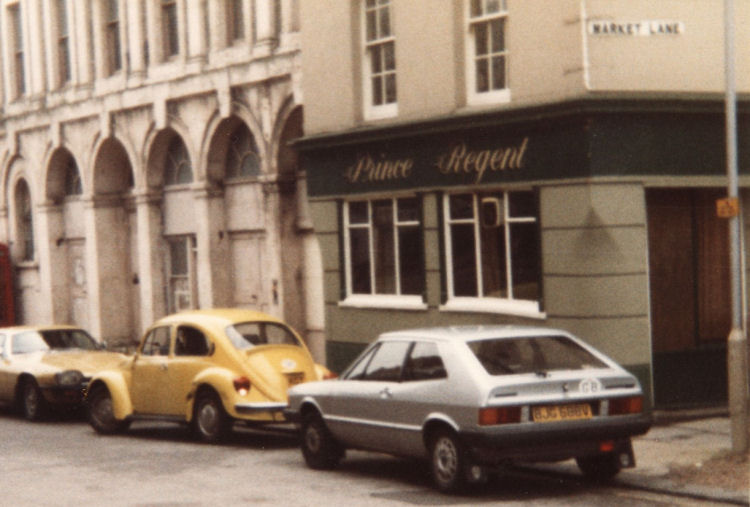 Above
photo circa 1980 by Barry Smith. |
|
|
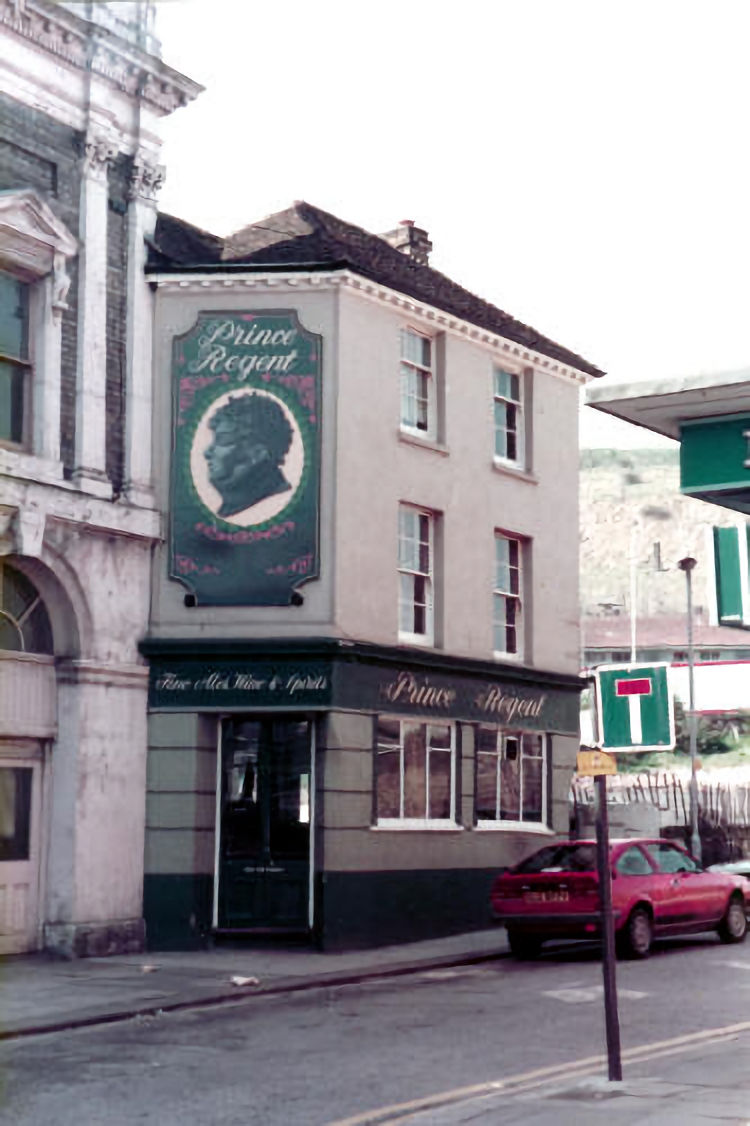
Above photo, 1983. Photo by Eddie Chard. |
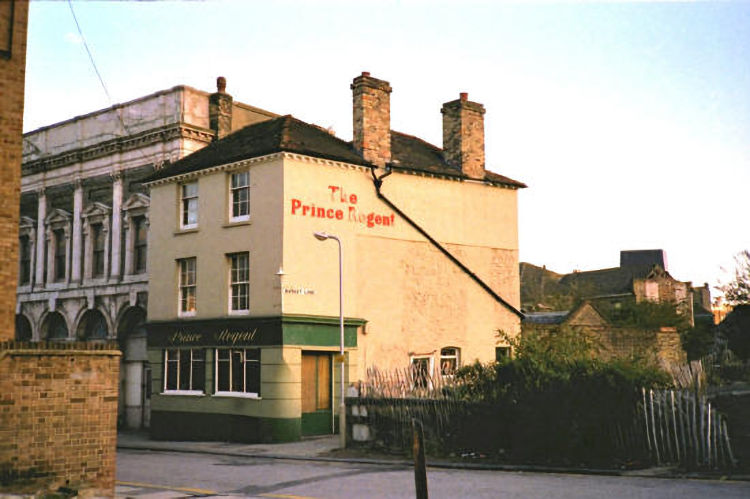
Above photo, 1983. Photo by Eddie Chard. |
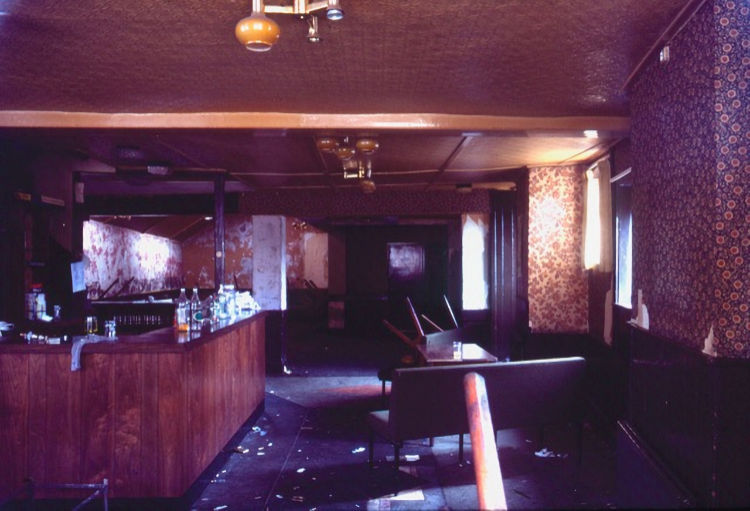
Above photo, date unknown, but I believe just after closure. Kindly sent
by Kenneth Chapman. |
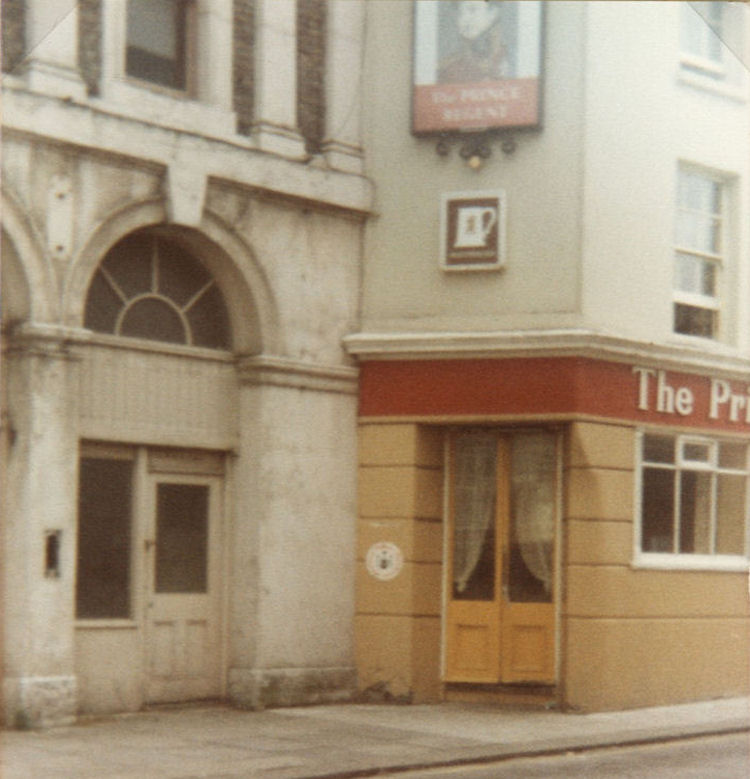 |
|
Above photo, circa 1989 by Barry Smith. |
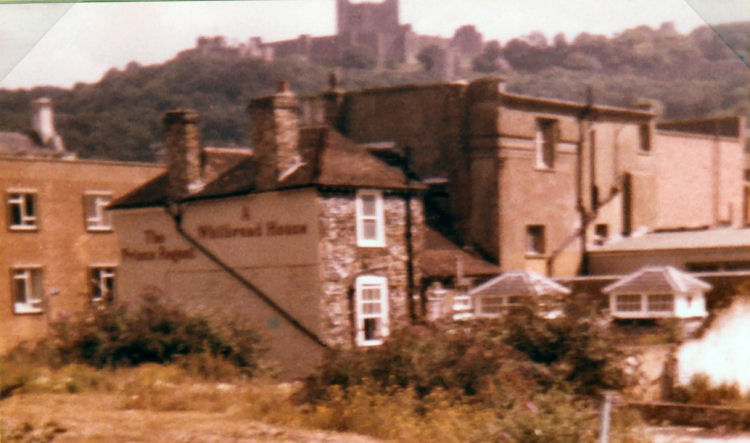
Above photo, circa 1989 by Barry Smith. |
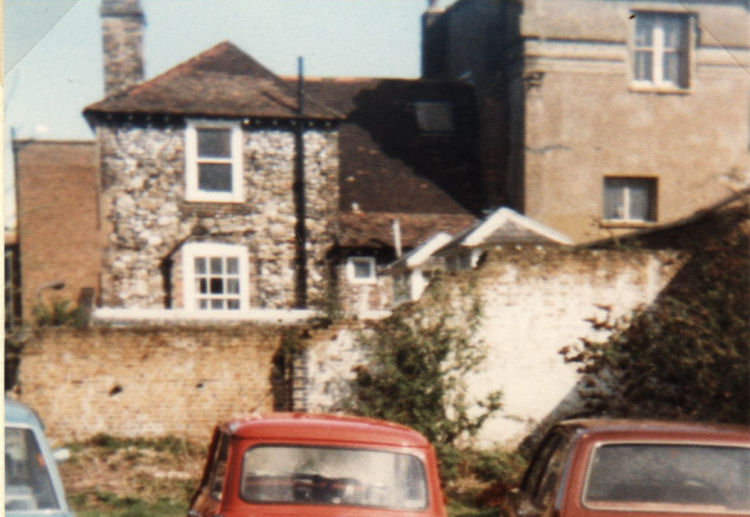
Above photo, circa 1989 by Barry Smith. |
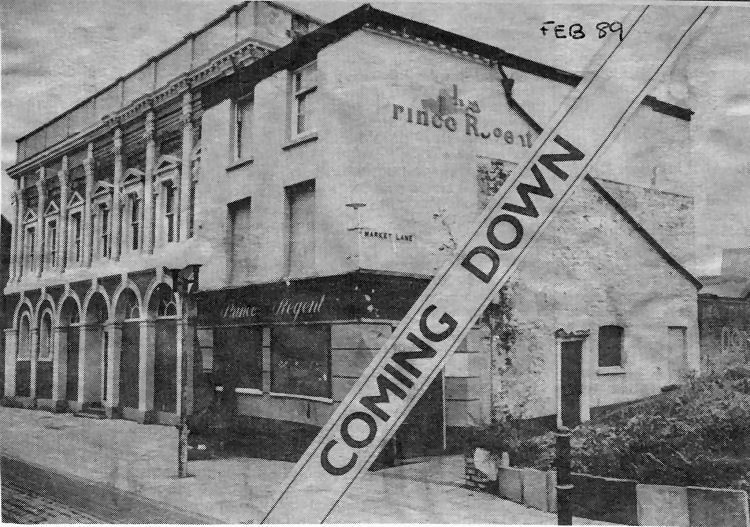
Above photo February 1989. |
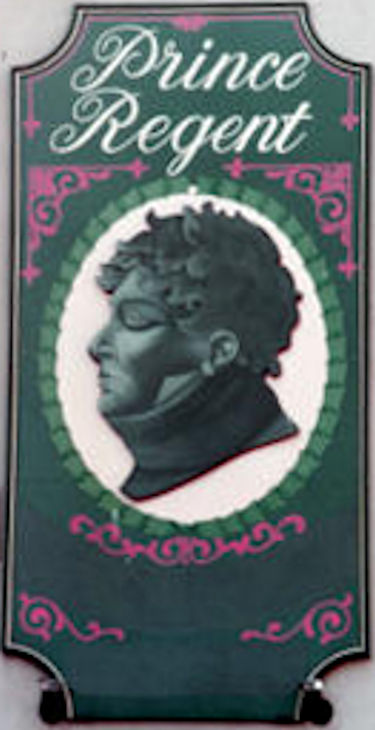
Above sign, 1983. Photo by Eddie Chard. |
On the corner with Tavernor's Lane and Market Lane, the material used for
its construction gave the impression of antiquity or perhaps of penny
pinching.
The back wall in particular seemed to have been erected with any odd
bricks or stone which were lying conveniently around at the time.
It was always referred to as the "Regent Inn"
or "Regent Wine Vaults" during the last century and
Edward Thompson served there in 1823.
|
Dover Chronicle 24 November 1838.
"Flower of Kent."
Grand Booth, (adjoining the "Prince Regent Inn.)
J. Brockman and Co. Begs most respectfully to inform the visitors,
Millitary and Naval Officers, and the Public generally of Dover and its
Vicinity, that they have engaged the Splendid Booth called the "Flower
of Kent," adjoining the Prince Regent Wine Vaults; which will be
Superbly Illuminated with thousands of brilliant Variegated Lamps, in
all kinds of devices.
Excellent Refreshments will be provided. Wines, Spirits, Stout, Ale,
&c., of the very best quality.
A Superior Band from London is engaged expressly for this Booth.
(I
believe this was a pop-up pub set up for a short time for the town fair
and run at the time by the landlord of the "Prince Regent." There is
further reference to this at the "Crown
and Anchor Tavern." Paul Skelton.)
|
|
From the Dover Telegraph 23rd November 1833.
Regent Wine Bar. Market Place Dover.
John Brockman most respectfully begs to return thanks to the inhabitants
of Dover and its vicinity, for the great support he has received since
commencing business at the above establishment, and trusts, by careful
selection of his stock, which will warrant genuine, to receive a
continuance of their patronage.
J. B. Begs to call attention to the following lists of prices. The
unequalled celebrated Liquid Gin, or the Double Cream of the Valley;
also his Plin Gin unsweetened, both which are warranted to be of the
full strength, and the strongest that is allowed to be sold by Act of
Parliament, 12s 6d. by the gallon. Fine Old Cognacq Brandy 3s. 5d. the
best Wine Brandy 15s; fine Old Jamaican Rum 13s; Patent Hollands, 13s;
sold by appointment; Whisky, 16s; Milk Punch, Dantzic Spruce and a
variety of Cordials 13s. Wines in bottle and Draught; fine Old Port,
Sherry, Cape, Tent, Buccellas, Madeira, Lisbon, Teneriffe, Mountain,
Marsala, Hock, Moselle, and Claret, equally responsible. Barclay and
Perkins fine Stout and Porter, Flint and Kingsford's find Canterbury Ale
& Beer.
N. B. Families supplied in quantity and orders punctually attended to.
|
|
From the Dover Telegraph and Cinque Ports General
Advertiser, Saturday 25 May, 1837.
TO BE SOLD BY AUCTION, BY
MR. W. M. BUSHELL
At the "Royal Oak Inn," on Monday the 5th day of June, 1837, at 2
o''Clock in the Afternoon unless previously disposed of by Private
Contract, of which due Notice (will be given,) all that Messuage or
Tenament, or PUBLIC-HOUSE called the "PRINCE REGENT," with the Building
Ground, and appurtenances thereto belonging, situate in the Market
Place, Dover, to either with the adjoining Messuage or Tenement, or
Public-house, called the "REGENT TAP." - Subject to the present Lessee's
unexpired Term of ? years from the 6th of January last.
For further Particulars, apply to the Auctioneer, or to
MR. KENNETT, Solicitor.
|
A "Regent Tap", later called "Young England", dispensed beer from Market
Lane in 1851 and Buckham or Buckman kept the "Regent Wine Vaults" in 1853.
The "Tap" did not come under his supervision, that being kept by Hewing, but
the "Regent Tavern" was covered by the licence of the "Regent Wine Vaults".
The "Tap" itself seems to have been something of a hot seat. The many
doubtful characters who congregated there, with every encouragement from the
owner, were responsible for many a licensee losing his living.
All the pent up fury of years was said to have boiled over one Saturday
night in May 1853. During that disturbance the fighting was said to take
place from the top to the bottom of the house. The keeper was taken away to
answer a few questions but he told the police that the proprietor should
answer, as also did his follower, when his turn came shortly afterwards.
|
From the Dover Express and East Kent News, Friday 17 May, 1878
SHIP DESSERTION
James Brighton, seaman, was charged with deserting from the ship,
William Crundall, then lying in Dover Harbour.
William Bayley, a clerk of the Customs, produced a duplicate of the
articles of agreement, by which it was shown that the prisoner shipped
for £3 10s. 0d. per month, on a voyage from Dover to Dantizic.
Mr. James Crundall said: I am part owner of the brig William Crundall.
She has now left on a voyage to the north. The prisoner shiopped as an
able-seaman. I paid him £1 12s. 6d. in advance. While I was talking to
the Captain the prisoner came up to be in a bullying manner and asked me
if ballasting was fit work for a sailor. I said certainly, it's your
work. He said he would see be d______ first before he would do it, and I
then ordered him to go on board. I told him that it was a very
unpleasant thing for me to have to put a man in gaol, but I should
certainly have to do so if he refused to work. He then burst out
laughing and began to abuse me. I then sent for a Policeman; but when
the Constable came I thought I would give him another chance. Prisoner
then promised to do some work. I then ordered him to assist in unloading
the cart, which he commenced doing. When the cart was nearly empty the
Harbour clock struck twelve. He then said he should not do any more. I
told him he would have to finish, which he did. At ten minutes past one
he came ashore, and went into the “mechanic's Arms.” I watched for his
coming out. The Constable and I went and asked the landlord if the
prisoner was in the house, and he said he was not. The Policeman
eventually found him in the “Regent” public-house. The ship went to sea
yesterday morning.
Police-constable Cook deposed to finding the prisoner in the “Regent”
public-house on Saturday evening, drunk and asleep. He thereupon took
him to the Police-station.
Prisoner said he had hurt his back, and was unable to do his work. He
denied being away all day, but was at work in the afternoon.
The Bench committed the prisoner to fourteen days with hard labour.
|
|
From the Dover Express and East Kent News, Friday 26 July, 1878
STEALING WEARING APPAREL
William King, a private belonging to the 58th Regiment, was charged with
stealing from the South Front Barrack, two pairs of trousers, one pair
of boots, a muffler, one Guernsey, and a felt hat, the property of
William Smith, of the value of £3.
William Smith said: I am a sailor belonging to Woolwich. I came down to
Dover last Saturday morning. I went to the “Prince Regent” public-house,
Market lane, about nine o'clock the same evening, where I saw the
prisoner at the bar. I got into conversation with him about enlisting,
and he promised to take me to the barracks the same night. I went with
him to the barracks and slept with him. I slept in his bed and prisoner
slept on the floor beside me. I took off my clothes, which consisted of
two pairs of trousers, a Guernsey, a muffler, a pair of boots and felt
hat, and put them on the ground at the foot of the bed. When I awoke
about half-past five the next morning, I found that the prisoner was
gone and my clothes also. I then gave information to the Military
Authorities. I was aloud to remain in barracks up till last night. I saw
the prisoner yesterday in the guard-room and there at once identified my
Guernsey and felt hat, which he was then wearing. The things were then
taken off him and given to me. I asked the prisoner where my trousers
and boots were and he said he had them on, but they were not mine. The
lining was torn out of the hat. The value of the articles stolen is £3
0s.0d.
By the prisoner: They were not my trousers you had on. I told you I
belonged to the Militia.
Provost-sergeant Thomas Hayes said: the prisoner belongs to my Regiment.
He was absent on the morning of the 21st. yesterday afternoon he was
brought back by the Police, having been taken up at Whitfield as a
deserter. He was then dressed in plain clothes and had on a Guernsey, a
pair of tweed trousers, a black felt hat, and a pair of elastic side
boots. I took the last witness to the guard-room and showed the prisoner
to him, and he immediately identified the things by the marks on them. I
reported the case to the Adjutant and prisoner was handed over to the
civil authorities this morning.
By the Bench: prisoner didn't make any statement in the guard-room, but
said he could get the trousers; they were about three miles away.
The prisoner pleaded “Guilty” to the charge, and the Bench sentenced him
to six months' imprisonment with hard labour.
|
|
From the Dover Express and East Kent News, Friday 23 August, 1878
CHARGE OF STEALING A COAT
James Page was charged with stealing one coat from a van in Castle
Street.
Thomas Elgar said: I am a drayman in the employ of John Tritton, of
Staple. I was in Dover outside the “Prince Regent” public-house he and
another man came up to me and asked if I wanted any help, and I said
“yes,” and the man that asked me helped me. The prisoner went away, and
when I went to Cliffe's brewery I saw him there and he helped me to
unload. He rode with me in the van to the “Antwerp” stables and
unharnessed the horse. We left the van outside. I went with the horse
inside and the two men stood outside in the van. I was gone about half
an hour and then returned to the van. Both men were gone, and my coat
was missing (now produced). I gave information to the Police and I did
not see my coat before the evening, when the prisoner was along with a
Police-constable with the coat on. I gave him then into custody. The
value of the coat was £1. Both men were strangers to me.
P.C. Brace said: Yesterday afternoon about five o'clock I received
information that a coat had been lost, and I went to the Market Square
where I saw the prisoner going through the Market Lane with the coat on.
From the information I believed it was he, and I sent to the last
witness to come and follow me. I went after the prisoner and overtook
him by Fishmonger's Lane. I told him I should detain him until the
prosecutor came up, and prosecutor identified prisoner and gave him in
charge for stealing a coat from his van. The prisoner in reply said he
did not steal the coat, and that the prosecutor said he might wear it to
keep himself dry. There was a man named Bartlett following him, and
prosecutor said he was the other man. He went away directly he saw me go
up to prisoner.
Prisoner said the prosecutor gave it him to keep himself dry, and he
pleaded “not guilty.”
Committed for trial at the Quarter Sessions.
|
|
From the Dover Express and East Kent News, Friday 11 October, 1878
ASSAULTING THE POLICE
G. Martin was charged with assaulting Police-constable Corry, and
refusing to leave the “Prince Regent Inn.”
John Longley, landlord of the “Prince Regent Inn,” Market Square, said:
On Saturday evening, about ten minutes past ten, the prisoner had been
in the house some time, and after a little while he became quarrelsome.
I requested him to leave, but he would not, and used bad language. I
called Police-constable Corry. When he came the prisoner struck the
Police-constable, but he was afterwards put out.
Police-constable Corry said: I was called in the “Prince Regent” about
ten o'clock. I saw the prisoner in front of the bar, using bad language,
and the landlord told me to put him out. I told him to go, when he
struck me in the neck. I then run him out of the door, and with more
assistance I took him to the station. The prisoner was not drunk.
Prisoner was fined £1, and 7s. costs, or in default 14 days'
imprisonment. The money was paid.
|
|
From the Dover Express and East Kent News, Friday, 11 August, 1889. Price 1d.
LICENSED VICTUALLERS' SOCIETY
At the monthly meeting of the Dover Licensed Victuallers' Protection
Society, held at the “Regent Inn” on Wednesday, the 3rd instant, Mr. J.
Ward, of the “Priory Hotel,” was appointed vice-chairman in the place of
the late Mr. Isaac Kemp.
|
|
From the Dover Express and East Kent News, Friday, 16 January, 1891. Price 1d.
THE RUMOURS ABOUT THE REGENT
We are authorised to say that there is no foundation for the statement
made by the Chronicle last week that Sir Richard Dickeson had purchased
the “Regent Inn.” There is no doubt it would be a great public
improvement if the Market Place public buildings were isolated by the
removal of the “Regent,” but, seeing that Sir Richard Dickeson and
Company have good approaches to their spacious block of property, both
from the Market Square, and Queen Street, the advantage of the removal
to them, should hardly compensate for the outlay.
|
|
From the Dover Express and East Kent News, Friday, 13 March, 1890. Price 1d.
DRUNK AND BEGGING
Thomas Davis was charged with being drunk, and begging in the Market
Square.
Police-constable Pilcher said that on Sunday night, he was on duty in
plain clothes. At quarter past nine he was sent for to put the prisoner
out of the “Regent,” public house. Prisoner then went into the “Walmer
Castle,” and he heard him beg. The prisoner was drunk. Having received
complaints of him before, he took him into custody.
The prisoner was sent to prison for ten days with hard labour.
|
|
From the Dover Express and East Kent News, Friday, 8 February, 1901. Price 1d.
THE MAN IN THE GALLERY
Kate Doyle was charged with being drunk and disorderly and refusing to
quit the “Prince Regent Inn,” Market Square.
Police Sergeant Baker, Market Inspector, said that at noon on Monday the
landlord of the “Prince Regent” asked him to eject the prisoner, who was
sitting on the floor in front of the fire. He had refused to server her
beer. Witness put her out with the assistance of the landlord. She then
became troublesome and very violent. She had to be strapped on to the
ambulance, and her language on the way to the Station was disgusting.
She was drunk.
W. H. Doble, the landlord, said that on Monday prisoner came in and
called for a glass of beer. It was drawn, but then witness saw the woman
had had too much and he went and took it away again. She immediately
dropped down in front of the fire on the floor. Witness then had her
ejected by Police Sergeant Baker.
Prisoner said she came out of the Union, and had only had three glasses
of beef before she went to the “Regent.”
A man in the gallery said he would like to give evidence.
William Rogers, Adrian Street, a labourer, said that on Monday close on
twelve he was in the “Regent,” when the good lady in the dock came in
and called for a glass of beer, and was served. She stood by the fire
for a few minutes, and the barmaid objected to her being there, and said
she had no business in the public bar, and she went for the landlord,
who tried to take the beer from prisoner and spilt it over a letter she
had with her. She then squatted down in front of the fire to dry it. The
landlord then sent for the Inspector.
Prisoner promised to go back to the Union, and was discharged.
|
Perhaps a bit quieter by 1900 when five a.m. opening was allowed.
Although 1910 a fracas saw the landlord have a glass smashed over his head
in a fight that broke out in the pub.
|
From the Dover Express and East Kent Intelligencer, 4 April, 1902. Price 1d.
GLASS SMASHING
Frederick O'Dell was charged with smashing a glass panel of a door,
value £1 15s., the property of James Watson, proprietor of the “Prince
Regent” public house, Market Square.
James Watson said that just before two o'clock the previous afternoon
the prisoner and his mates came into the house and had a drink. After
that they went out again, but returned about 3.30 and stayed until five.
When they were there the prisoner's wife and his brother-in-law's wife
came in, and a few words were spoken between the men and the women,
which turned to blows. Witness had the prisoner ejected, but he
immediately returned and put his fist through the glass. The value was
stated to be £1 15s. by the insurance agent. Witness was standing close
to the prisoner when he struck the panel.
Police-constable Hambrook said that the previous afternoon he was called
to the “Prince Regent” by a barmaid. He saw the last witness and also
the broken door. The prisoner was standing in the Market Square, and on
witness asking him what he did it for he replied that they would not let
him in. Witness then took him into custody. The prisoner was very drunk.
The prisoner was fined 5/- and 7/- costs, and ordered to pay the damage,
£1. 15s. £2 7s. in all, or in default 14 days hard labour. He was
allowed a week in which to pay the money.
|
|
From the Dover Express and East Kent News, 29 April, 1904.
Price 1d
LICENSING
Permission was granted to Mr. W. J. Dolbear to draw at the "Prince
Regent," Market Square, the outgoing tenant being Mr. J. H. Watson, who
has been ordered to leave Dover on account of his health.
|
|
From the Dover Express, Friday 10 December, 1909.
ALTERATIONS TO A DOVER INN.
At the Dover Police Court on Friday the Magistrates (the Mayor, Mr. J.
L. Bradley, Mr. W. Bradley, Mr. W. J. Bussey, and F. G. Wright) approved
a slight alteration to the "Prince Regent."
|
|
From the Dover Express and East Kent News, 1 April, 1910.
GLASS SMASHED IN LANDLORD'S FACE
EXTRAORDINARY SCENE AT THE REGENT.
At the Dover Police Court on Tuesday, before Messrs. F. G. Wright and
W. J. Bussey.
Elizabeth Gardner, 6, Mount Pleasant, was charged with inflicting
grievous bodily harm on Charles Wallace, landlord of the "Prince
Regent," by throwing a glass at him.
Charles Wallace, landlord of the "Prince Regent," Market Square,
whose head and eyes were wrapped in bandages, said about a quarter to
ten last night the prisoner's husband came into the bar alone. I refused
to serve him with anything to drink, I refused to serve him as the
prisoner had been to the house half an hour earlier with a poker in her
hand, running after a man who had come in. When I would not serve the
prisoner's husband he commenced to strike the customer's in the public
bar. As I went round to separate them the prisoner opened the door, came
inside, and picked up a pint glass off a barrel and threw it at me, and
shouted to her husband to run away at once. The glass struck me on the
forehead, stunning me, and it broke on my forehead. The parts of the
glass produced were picked up in the bar. I was bleeding terribly when
one of the police came. My wife and a man were present. When P.C. Fox
came the prisoner and her husband had gone. I knew her as Mrs. Collins.
Two police constables, one of whom was P.C. Howden, attended to me, and
Dr. Howden also came. The prisoner was brought to the house half an hour
afterwards. I am certain she is the woman. I saw her pick up the glass,
but could not get at her. Her daughter came in with her. It was not the
daughter that picked up the glass, but the prisoner. I do not say the
glass was meant for me but for someone else in the bar, but I copped it.
Prisoner: I am innocent of the crime.
Henry Dowle, 13, Hartley Street, said; On Monday night, I was at the
"Prince Regent," just before 10 o'clock. I saw a man named Jack Baker
come in. The landlord refused to serve him, and he created a
disturbance, and struck my brother. My brother took his own part. The
landlord came round the bar to part them. My brother ran out into the
Empire and fetched a policeman. The prisoner and her daughter came into
the bar. She picked a pint glass up and flung it across the bar. It
struck the landlord on the head and it broke. She was close to the
landlord at the time.
The prisoner: What a wicked man!
The Magistrate directed the prisoner to keep quiet.
The prisoner: I must tell the truth.
Witness: I am certain she threw it. The landlord bled very much, and
a doctor was sent for. I was there when the police came.
The prisoner said that the witness was the cause of the row. She hit
him over the head with a poker as he said he was going to serve them all
alike.
Dr. Howden said: I was called to the Market Square, where it was
stated that a man was bleeding to death. I was taken to the "Prince
Regent," and found the landlord bleeding freely from wounds on his face.
I stopped the bleeding. There were three or four wounds on the forehead
and bridge of the nose. The eyes escaped. The wounds were superficial.
P.S. Fox said: I was fetched to the "Prince Regent," and saw the
landlord, and he complained of being assaulted by the prisoner. I found
her at 6, Mount Pleasant. I asked her if she had been in the "Prince
Regent" that evening. She said, "Yes, an hour and a hald ago." It was
then 10.45. I brought her back to the "Prince Regent," and the landlord
identified her as having thrown a glass at him. "She said; "I am
innocent. Jack Baker, the man I live with, threw the glass, and my
daughter who was there saw it." She was sober.
The prisoner: I think it very hard for me to be put on for other
people when the man who I live with did it. I want him brought to the
Court; he is indoors. I want him brought to the Court so that I can have
satisfaction.
Mrs. Ellen Jones, 5, Mount Pleasant, the daughter of the prisoner,
said: My mother lives with a man named Jack Baker. At a quarter to ten
last night I went to the "Prince Regent" with my brother. John Baker and
another man walked into the Regent after Mr. Doyle, who had blacked his
eye. Baker went to hit Dowle, but could not get at him. He then hit his
brother, John Baker then picked up a glass to hit Dowle, and instead
struck the landlord. My mother is innocent of the crime. Baker is at
home. He will come if fetched, but will say someone else did it.
The Magistrates ordered Baker to be sent for.
In answer to further questions witness said that her mother never
went out after nine o'clock, when she had gone to the Regent with a
poker in her hand. She did not go out after. P.C. Baker came to arrest
Baker for being a deserter from the Royal West Kent Regiment, but she
had his discharge papers.
Another sister came forward to give evidence, but, she made a cheeky
remark to the Magistrates as she came up, and was then ordered to stand
down.
On the man Baker being brought forward, the Magistrate's Clerk,
addressing him, said: You were in this case; you were in the Regent last
night; that is where you got your black eye? - Yes.
This woman here is charged with throwing a glass at the landlord. You
are not obliged to give evidence in this case, as the allegation is that
you threw the glass? - I do no know who threw it. I am certain and sure
she did not as she was not there. There were glasses going for five or
six minutes from all parts. There were five or six fighting there, and I
was given a black eye.
The Chief Constable: You had the black eye before this happened. A
man gave you the black eye on the top of Military Hill.
Baker: I was hit in the eye at the top of Military Hill and the
Regent too.
The Magistrate's Clerk: Why did you not come down before?
Baker: I felt too ill.
The prisoner: This man I live with threw the glass.
Baker: I own the truth; I did.
The Magistrates Clerk: You cannot blow hot and cold like that; stand
down.
The Magistrates said they had given very great care to this case. It
was a very lamentable thing to have these orgies in public houses. It
appeared to be very disgraceful to all concerned, and to throw glasses
was very dangerous; someone might have been killed. As to the witnesses
the prisoner had brought, they did not believe a word they had said, and
the prisoner would go to prison for two months' hard labour.
|
|
From the Dover Express, Friday 23 January, 1914
PUBLIC HOUSE SCENE
At the Dover Police Court on Tuesday, before Messrs. Edward Chitty
(in the chair), and F. Wright.
Horace Fry was charged with having been drunk and disorderly in "The
Prince Regent," public house, Market Square, and further, with wilfully
breaking a glass panel in the bar door of the public house, doing damage
to the amount of 40/-, the property of Mr. Walter B. Warner, licensed
victualler.
Mr. W. B. Warner, the licensee of the "Prince Regent," Market Square,
said: The prisoner came in about 10.40 p.m. yesterday. He was not sober,
and called for two penny-worth of ale. I refused to serve him, and
ordered him to leave the premises. He refused to go, and demanded an
explanation as to why he should not be served. I told him it was because
he was drunk. Two soldiers, who were in the bar, tried to persuade him
to leave, but he struck one of them in the right eye. The two soldiers
pushed him outside, and shut the door on him. Prisoner went round to the
public bar door in the Market Square and as about to walk in when I shut
the door, and kept it shut. I remained there for a few minutes, and, as
he appeared to be going away I turned to leave the door when I heard the
glass panel smashed. I ran out and caught hold of the prisoner, and
asked him what he had done it for. He said, "I have done it." I said
that I would have to give him in charge and he said "Well, I have done
it." There were two police officers in the Market, and I handed prisoner
over to them. I value the damage at £2.
Prisoner said that he was going out of the door, and the two soldiers
said something to him and followed him out.
Witness: They did not leave the house.
Prisoner: The window was broken in self defence.
P.C. Vincent said: Yesterday, about 10.30 p.m. whilst on duty in the
Market Square I hard a smash of glass in the direction of "The prince
Regent." I went towards the house, and saw Mr. Warner detaining the
prisoner. Mr. Warner complained that the prisoner had broken the glass
pane in the bar door. I saw that the pane was broken. Mr. Warner gave
prisoner into custody, and at the Police Station prisoner was charged,
but made no reply.
Prisoner had nothing further to say.
The Chief Constable said that he was a Dover man, and had always
behaved himself very well. He was married, and had a family, and was in
good work. He believed that for some years prisoner was in the Navy. He
had not been charged before.
The Chairman said that the Bench would take into consideration
prisoner's good character and the fact of his having a wife and family.
He was liable to a fine of 40/- and £5 for the two charges, or two
month's imprisonment. It was fortunate that he had not been charged by
the soldier for assault. He (the Chairman) hoped that this would be a
warning to him, and hoped that prisoner would give up the drink, which
it appeared, had led him into very serious difficulty. Prisoner would
have to pay the costs 6/- in each case, and £2 the amount of the damage.
Prisoner's wife paid 12/- costs, and prisoner was allowed a fortnight
in which to pay the £2.
|
|
From the Dover Express and East Kent News, Friday, 15
May, 1914. Price 1d.
LICENCE TRANSFER
The licensee of the "Prince Regent," Market Square, was transferred
from Mr. J. B. Webb to Mr. E. Hillier, of the "White Horse," Bishop
Stortford. A letter was read from Dr. Morrison to the effect that it was
necessary for Mrs. Webb to leave Dover for her health, Mr. Webb stating
that that was the reason for his giving up the licence.
|
|
From the Dover Express and East Kent News, Friday, 5 February, 1915. Price 1d.
NOT A HEAVY DRINKER
At the Dover Police Court on Wednesday, before Messrs. J. Scott, and W.
D. Atkins.
James Berry, was charged with being drunk and disorderly in the Market
Square.
Prisoner: I was not guilty of drunkenness, I only had five pints all day
yesterday.
P.C. Perkins gave evidence that on Tuesday evening at 8.15 he saw the
prisoner ejected from the “Prince Regent” in the market Square, and as
he would not go away, but created a disturbance and then went back to
the public house.
Prisoner: You are a liar and I must call you one. As soon as I came out
of the bar you caught hold of both my hands and would not give me a
chance.
The Chairman: Let him finish his evidence. You are doing yourself harm
by going on in this way.
Witness continuing said he gave prisoner a chance to get away but he
went back to the house and the landlord turned him out again, and so
witness arrested him.
Prisoner: Did not you fix me by both hands? Did you give me a chance?
Witness: I asked you to go away quietly.
Prisoner (shouting): You did not give me a chance.
The Chairman: Don't spoil your chance by going o like this. Do you want
to ask anything else?
Prisoner: No. His words are not true.
Ernest Hillyar, landlord of the “Prince Regent,” said the prisoner was
in the four-ale bar the previous evening and caused a disturbance. He
wanted to fight a man. He never purchased any beer.
Prisoner: You served me all day long. How did I get drunk if I never had
any beer?
Witness: I never served you and I was in charge of the bar. Continuing,
witness said: As the prisoner created a disturbance I put him out. I
could not say truthfully whether he was drunk or not, but I should say
he had had some. I did not hear what occurred between P.C. Perkins and
the prisoner.
By Mr. Scott: Witness saw prisoner in the bar in the afternoon, but
could not say when he came in in the evening.
Prisoner: When you pushed me out of the door did not the Policeman catch
hold of me without giving me a chance.
Witness: I shut the door and did not see what happened then.
Prisoner: I was not drunk for I never had more than ten half-pints of
beer yesterday, and working in the meantime. You don't call that much.
Mr. Atkins: What do you call the meantime?
Prisoner: Pushing a barrow in the meantime. Ten half-pints is not heavy
drinking. A man came into the house and challenged me to fight. I had to
take my part.
Several previous convictions were proved against defendant and he was
fined 10s. and 7s. costs. The money being paid.
|
|
From the Dover Express, 15 May 1914:- A letter was read from Dr.
Morrison to the effect that it was necessary for Mrs. Webb to leave Dover
for her health, Mr. Webb stating that that was the reason for his giving up
the licence.
|
|
From the Dover Express and East Kent News, Friday, 21 December, 1923. Price 1½d.
LICENSING BUSINESS
Mr. Jones of the “Prince Regent,” Market Square, asked for the extension
of the music and singing licence to dancing, for a room downstairs,
which it was stated would hold thirty couples. – A temporary licence
until transfer day was granted.
|
Certainly a popular house in world war two. It had closed for the duration
on 11th October 1940 but Moody, who had been with the house since 1935,
reopened in 1941 and was succeeded by his wife Doris in 1964.
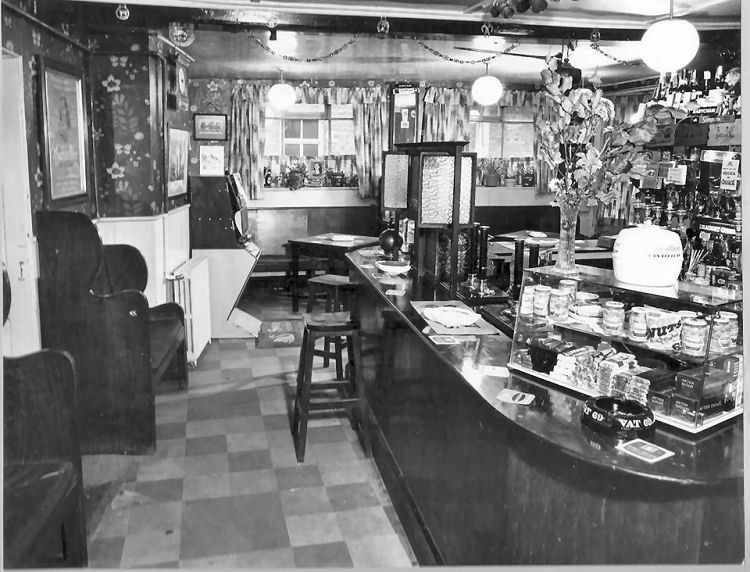 Above photo, showing the inside of the pub circa 1968.
|
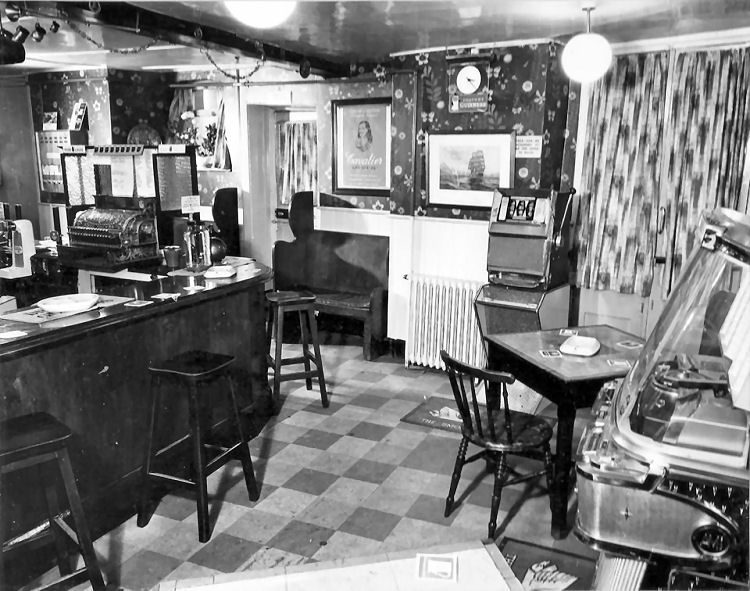
Above photo, showing the inside of the pub circa 1968. |
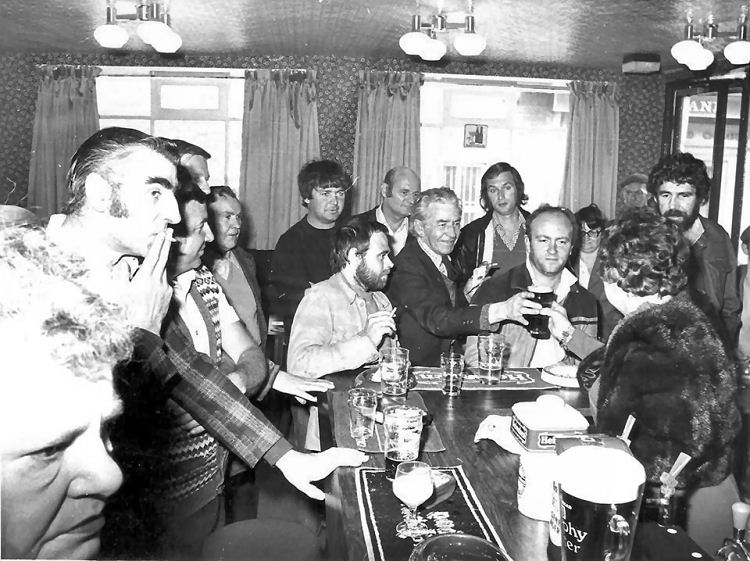
Locals inside the pub circa 1968. Doris Moody behind the bar. |
|
From the Dover Express and East Kent News. 21 January, 1921.
LICENSING BUSINESS
The transfer of the licensee of the "Prince Regent," Market Square,
from Mr. George Wood to Mr. George Coe, of the "Greyhound," Union Row. -
Mr. Chitty asked if this house was not one of the houses which had been
a difficult one to run, an did the Chief Constable consider that the new
tenant would be able to carry out the duties satisfactorily? -
Chief Constable Green said that the licensee was a life-long abstainer,
and he had had no complaints since Mr. Coe had been there, December
20th.
|
|
From an email received 16 February 2024.
From a letter written by G A Taylor, a Royal Naval Volunteer Reserve trainee Signalman, on 28th
January 1940.
Dover Comparison.
When I went down to the Calvi the other day I was struck, probably
because I was about in daylight, which is a rare thing for me, by the
great difference in what you might call social circumstances between
living at the Castle and being a Trawlerman.
From the Castle you descend to the town through a more or less
high-class residential area and arrive in the Market Square. You
frequent quiet, decorous pubs (relatively speaking) and generally move
in widely accepted circles.
But as a Trawlerman you approach the town from the opposite side. You
get ashore at the dock steps, pass warily under the swinging coal grabs
and along past the docked ships which, nowadays, stripped for action,
painted grey and streaked with salt, always seem to be breathless and in
a hurry, as if they really can’t afford to waste all this time in dock.
Then you come to the fringe of the small dockland where the railway
sidings overflow onto the roads and the roads end abruptly on the
unprotected edge of the dock. You turn right, continuing past (if you
must be pure) the famous dockside pubs; past The Mitre, The York House
and then you come to The Clarendon which marks the beginning of the
notorious Snargate Street, the Wapping High Street of Dover. This is the
main artery between the docks and the town. It is a narrow street, too
curving to be called straight yet straight enough to be a pretty direct
route. A road as doubtful geographically as it is morally and once
entered upon you can’t leave it from one end to the other, for it is
joined by only one other street and that is a short road, at the town
end, leading towards the Front.
Snargate Street is the social centre of the Dover Patrol and as such, is
entitled to its share of glory, though tougher things than glory have
come to a bad end there, for even in daylight, its dirty twin rows of
buildings and small scowling shops, many empty, with shattered windows
and debris filled interiors, lend it a very sinister aspect. And no part
of the town is as conscientious about its black-out, though it is
doubtful if such careful shuttering of windows and masking of doorways
comes from a sense of duty so much as a sense of profit.
But amidst this huddled crowd of cafés, second-hand bookshops, barbers
and chemists there are four places that any Trawlerman will know.
There’s The Royal Hippodrome where, for sixpence, you can see a two-hour
variety show (of sorts) with strip-tease thrown in. There’s the
Salvation Army Hostel where anybody’s welcome. There’s the Working Men’s
Club which admits Service members for a shilling a quarter and makes
them welcome, providing they can stand up and keep fairly quiet. There’s
The Invicta public house where anybody’s welcome while he’s sufficiently
in possession of his senses to spend any money he has been so misguided
as to bring ashore with him.
Leading out of Snargate at one end is a narrow, dark passage which winds
its furtive way, after many twists, into the Market Square. Down this
passage is the most famous pub of all, The Prince Regent.
There you’ll find Dinah, the barmaid, who at present is having all her
teeth out and has seized on this singularly inappropriate moment to
start gazing archly at all the new customers (and a few old ones) and
remark that as it’s Leap Year, she really is going to get herself a boy.
And there’s Kay too. She’s a little dark girl, about nineteen years old,
who’s “Kay” to literally hundreds of soldiers and sailors and, every
night, she plays the accordion to them, anything they think of, and
generally keeps them happy. Early in the war the Daily Mirror called her
the ‘Modern Mlle from Armentières’, but she’s more than that, for not
only does she keep the party happy, she keeps it scrupulously clean as
well and that takes some doing, so more power to her elbow. I like Kay
and so sometimes, when she gets fed up, which isn’t very often, she
confides in me (very flattering this) and I play the piano for her to
dance to, because she dearly loves to dance and gets few opportunities.
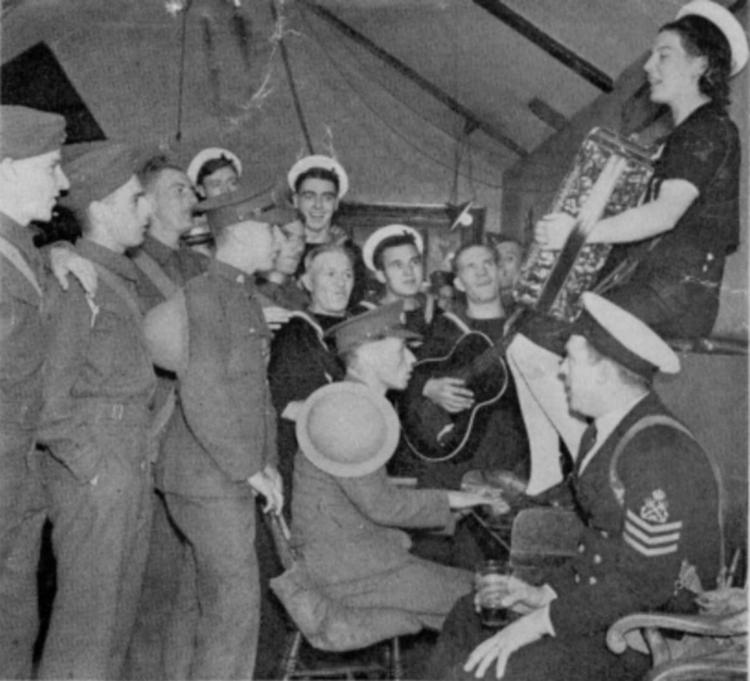
And I like all this, probably because I’ve had so much fun; and, as I
walked down Snargate in the morning I was reminded of those good times
by the surprising number of people with whom I was acquainted. In the
doorways of one or two sweaty-windowed cafés there stood waitresses,
still sleepy-eyed, for Snargate naturally wakes late, who called a
greeting of some sort after me. Then I met the Steward of the Working
Men’s Club on his way to open the premises; then the hunch-back manager
of The Hippodrome and the bent little boot repairer called to me from
opposite sides of the street; and the barmaid of the Invicta, whitening
the front step and not looking at all her usual come-hither self. And
she knew and she didn’t mind. And there are Trawlermen by the dozen,
mostly ashore on the early boat on the official errand of collecting the
mails and the unofficial business of getting a quick beer, with others
unofficially ashore for reasons of their own and obviously wearing a
scolding conscience on their shoulders.
There I’ll stop the tour of the waterfront for tonight, but if I talk
about teaching Kay a new tune, or meeting Sunshine in the Club, you’ll
have a good idea of what I mean without further elaboration on my part,
won’t you?
Later on, in April 1942 whilst serving on HMS Royal Eagle, the paddle
steamer on which he crossed to Dunkirk, he came across a magazine on
board ship and on April 8th he wrote as follows:-
We’ve been presented with some back copies of a big Yank magazine and
in one I found the enclosed photo of Kay and thought you might like to
see it. It was taken in September 1939 - you can tell that by all the
white caps in evidence and the general air of smartness and comfort. She
has the original of the photo framed on the wall just about where her
back is. Dover, as I said, is following me about at the moment.
The photograph of Kay (from Life magazine apparently) that he
described was in his papers.
|
|
From the Dover Express and East Kent News, Friday, 3 May, 1946.
PUBLIC HOUSE SCENE
At Dover, on Thursday, two Fusiliers of the Royal Inniskilling Fusiliers,
Hugh Taggart and Samuel Swann, from the B.A.O.R., pleaded guilty to damaging
windows at the "Prince Regent" public house and assaulting the landlord,
Frederick Moody. Evidence was that the assault took place after defendants
had been put out on account of their condition. Soon after, Mr. G Rowe, 20
Dour Street, who was in the Dovorian Restaurant, saw the soldiers smashing
the windows, and followed them until he saw P.Sgt. Steel, who arrested them.
Taggart was fined £3, and Swann £3, and £6 12s. costs for the windows.
|
|
Dover Express 9th August 1946.
Town, Port & Garrison.
The engagement is announced between James Bannister, eldest son of Mr. &
Mrs. Bannister of 19 Stanway Road, Ely, Cardiff, and Joan Moody,
daughter of Mr. & Mrs F. Moody, “Prince Regent”, Market Square, Dover.
|
|
Dover Express 3rd September 1948. Town, port & garrison.
The wedding has been arranged between Joan, daughter of Mr. & Mrs. F.
Moody, "Prince Regent", Market Square, Dover and "Jimmy", son of Mr. &
Mrs. J. Bannister, 89 Stanway Road, Ely, Cardiff and will take place at
St. Mary's Church on Saturday September 4th at 2.30.
|
|
From the Dover Express and East Kent News. 22 August 1952.
DRUNK IN MARKET SQUARE
The maximum fine for the offence of £2 was imposed on Saturday by
Dover Magistrates on Frederick John Caldwell, a 28 year-old labourer, of
9, Beaufoy Terrace, Dover, for being drunk and disorderly in Market Lane
the previous night. Caldwell admitted the offence.
Sgt. Brown told the court that at 10.30 the previous night he was in
the Market Square when he saw a crown near the "Prince Regent."
Approaching the officer found that an argument had developed and he
asked the people to go away. Caldwell refused to go and used obscene
language so he was arrested and taken to the Police Station. Sgt. Brown
added that at times Caldwell's language was atrocious and just before he
was arrested there were some ladies in the nearby passage who must have
heard the remarks.
Caldwell explained to the court that it was the first time he had
ever been drunk and that it would never happen again.
Told there were no previous convictions the Chairman of the
Magistrates (Mr. G. Golding) imposed a fine of £2 adding "this type of
conduct must cease."
|
|
From the Dover Express and East Kent News. 12
September, 1952.
Magistrates Reduce Length
An application for an occasional licence to supply liquor at a dance
at the Co-operative Hall from eight in the evening to one a.m. was
refused by Dover magistrates on Friday after the Police had made
observations in regard to a previous occasion. The licence was granted
till midnight.
Making the application was Mrs. F. Moody, of the "Prince Regent," and
the dance for which the drinks were required was the Dover Athletic
Club's at the Co-operative Hall next month.
Inspector Wilkinson pointed out that on July 4th Mr S. Moody was
granted an occasional licence to sell drinks in the same hall. Outside
the hall there was a brawl in which a Police-Sergeant was assaulted.
Mrs. Moody agreed that there was an argument in the hall, but the men
concerned were put out of the dance and the brawl occurred outside
afterwards.
Mr. Byford (Chairman of the Magistrates) said the licences would be
granted until midnight, but he would like to warn the licensees that
any similar occurrence in future might jeopardise the application.
|
|
Contributed by Canterbury Libraries
People in story: Joan Wheatley
Location of story: Dover, Kent
Background to story: Civilian
Article ID: A3125080
Contributed on: 13 October 2004.
My Memories of WW2
I lived with my family, Dot and Fred Moody, in the Prince Regent
public house, Market Square, Dover. War was imminent, so my parents had
made arrangements for me and my younger sister and brother to leave
Dover and stay with Grandparents in Chartham, later moving to Bracknell,
where I attended school until I returned home at Christmas 1943.
The Prince Regent was a big public house with a very large room
attached to the bars, every night was filled with army and navy
personnel who came for a good "sing song" night out. My older sister,
Kay, was a talented musician on the piano accordion and entertained the
troops from opening time until closing time with all the wartime songs
they could sing along to. A reporter from the Daily Mirror came down and
wrote an article about this and took photos, which I still have.
My father was deaf so just kept all the boys under control but my
Mother was like a Mother to them all. On many occasions if she thought
any of the boys as she called them could not afford another pint she
would take two shillings and give them change for ten shillings so that
they could enjoy themselves for a bit longer.
The Dutch boys repaid my Mother for all her kindness by making her a
VIP on three Reunion trips to Dover. On these occasions she was
presented with an oil painting of the Market Square with searchlights
trained on the Prince Regent painted by a Dutch artist and a beautiful
very large Delft Ginger Jar (my description). She has also been
mentioned in two books published in Holland written by Hans Larive, SOE,
- MTB's Command and Gerard Degger, 1st Officer - MTB's.
Serving beer was non-stop from opening time to closing time so I also
served behind the bar and got to know so many of the customers and
prayed that they would be coming in another evening especially when they
were recalled during the evening for duty, either to man the the great
guns or to go to sea.
After closing time it was wash the glasses, sweep up and head for the
caves for the night.
One morning we came home to find a shell had hit the Museum next door
and a number of stuffed animals were laying on the flat roof, when we
spoke about it people thought we were suffering from shell shock.
I have so many stories and memories perhaps one day I might write
them down for my family to read.
(Click here)
|
|
In response to the above article, I have recently received the
following email from Edward Cogdell.
Dear Sir,
While browsing on the internet, and thinking of my time in Dover
(July 1940 -Feb 1941) I came across Mrs Joan Wheatley's story of The
Prince Regent. My interest was instantly aroused. From the first night
out I had in Dover until I left in 1941 it became my local. It brought
back so many memories. I remember Mr & Mrs Moodie quite well and their
daughter Kay, who we called Kath. In fact I was in the Regent the night
Kath got engaged, and remember singing on the table as she played the
accordion. I also remember the barmaid who was called Di, but not sure
if her name was Diane or Dinah. But she was a niece of the Moodies and a
cousin to Kath. She lived in the Regent but occasionally went home to
Dymchurch. I am 89 years old and my thoughts often drift back to those
torrid days of 1940, and wonder what happened to Kath and Di, and if
they are still alive. Could you possibly put me in touch with Joan
Wheatley?
Incidentally, many years ago I wrote a book about my Army life just
for my Granddaughters to read, and the title of the book was '"TWO PINTS
AND TWO BOB CHANGE", this confirms 'Mother Moodie' and her 2 shillings
and 10 bob change.
Some years ago Ken Flint started a newsletter for the white cliffs
veterans, and he intended to write a book, so I sent him some memories
of mine, which he in time passed to a Mr Humphries who mentioned my
Dover memories in his book. "SHELLFIRE CORNER." Hoping you can oblige
and help me in my quest
Yours Sincerely,
TED COGDELL.
P.S. My book was not for publishing.
Ted has kindly sent me a passage from his memoirs and given
permission to publish on this web. The article is below.
DOVER, AND THE BATTLE OF BRITAIN.
Our Regiment, just recovering from the debacle of fighting in Norway,
and re-equipped with new boor guns and transport was once again
the only fully mobile Light Anti Aircraft Regiment in the army.
Three days ago we had left Gails Camp in Ayrshire and rumbled
southwards. And now we were traveling through Kent, 'the garden of
England'. We had passed through Canterbury and fast approaching Dover.
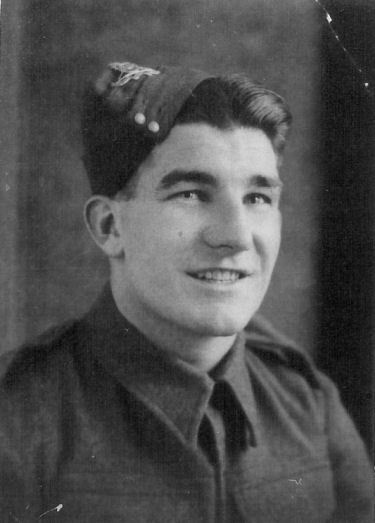
Even before reaching this historic town, we could see the barrage
balloons floating lazily but protectively in the blue sky. Our convoy
rolled into the town square then up the hill giving me my first glimpse
of Dover castle. It looked dominant, pugnacious and defiant in those
early days and remained so till the war ended.
Dover with its white cliffs, harbour and breakwater, the town and its
people saying “Standfast, they shall not pass” - This was Dover in 1940.
Soon to be known as ‘Hellfire Corner'.
We had no time to look at the scenery, onwards along the Dover/Deal
road, past Connaught barracks and no stopping at the Swingate pub for a
pint. Most of Troop Headquarters drop off at the Radar station which for
a few days was to be our Headquarters. But being a Dispatch Rider I had
to carry on until all the guns were in positions already recced. - Turn
right off the main road, and down the lane to St Margaret's. Drop a gun
off here, another there, one by Bob Dares farm through the village and
back along the cliff road and guns left looking out over the Straits.
Now I have to go around the gun sites again and collect the 'guns
ready for action‘ reports from the Sergeants in charge. By the time I
got back to the Radar station the lads not on duty had taken advantage
of the liberty truck and gone for a pint or to take a look at their new
home. The Troop Sergeant Major told me to make myself scarce, so I
jumped on my bike and headed for Dover.
The first pub I found was the Prince Regent and this became my local
when duty allowed. I managed to swallow 2 pints before closing time,
then it was back to Headquarters.
Next morning at breakfast the conversation had turned to last night
and the pub. ‘Scud' a gunner pal mentioned that the barmaid had asked,
"who was the good looking Dispatch Rider that came in?" Being the only
Dispatch Rider there, I said to Scud, "that was me". Scud didn't agree
saying, I was an ugly b…..d!
The next night when I went to the pub, the barmaid was quite
friendly, so much so, and to my embarrassment on other occasions when I
went there, she would call out, “kiss me Taffy”, all in good fun. And
totally worth it. When Len and I were broke we would somehow scrabble 2
shillings and off to the Regent. Due to Do and her Aunties kindness we
would enjoy a goodnight out.
It was not all beer and skittles in Dover, in fact quite the reverse.
It was the time when Hitler was hoping to destroy Britain's Airforce,
and wipe our airfields out in preparation for his forces to invade
Britain. What wishful thinking.
Dover nestling in the lee of the white cliffs and overlooked by the
Castle was in fact the ‘frontline'. There were few days or nights that
went by without being bombed or shelled from the French coast. For the
Gunners it was not a case of one or two hours off. 'Stand to was one
hour before sunrise and Stand down one hour after sunset if they were
lucky,' While the air-raids were taking place and the guns were in
action, other gunners were carrying ammunition to the guns or standing
by to change the barrel if it got too hot, which it frequently did in
long raids. When the all-clear sounded the cook would bring a much
welcomed bucket of Char (tea) to the gunners, but there were times when
the alarm went even before they could taste their tea or stand down.
It was 'plane left, plane right, height 10,000 or 15,000 feet.
FIRE!!' This sort of action was a certainty day in day out. After our
experiences in Norway, our aircraft recognition was very good, one
glance and we could tell if the bombers were Dormers, Junkers or
Heinekens and of course we had no problem picking the Junkers 87 Dive
Bomber, the dive bomber with the fixed undercarriage.
Troop Headquarters moved from the Radar station and was now closer to
the guns around St Margaret's. A couple of guns were deployed on the
breakwater, which wasn't the healthiest of places.
One Sunday morning I took a truck and some lads to the beach to fill
sand-bags to strengthen our gun positions. We were busy shovelling away,
chatting and singing when a huge water spout erupted outside the
breakwater. But no sign of enemy planes. However a few more huge
splashes and we realised that Dover was being shelled. It was the first
time in this war that the enemy had used their big guns to shell Dover.
But first time or not, we were off that beach faster than the next shell
could cross the water, (the date of the shelling Aug 12th 1940?)
Soon we had a 14 inch? Naval gun to fire across the Straits and
Calais. These were defended by Heavy Anti-aircraft Guns and of course by
163 Light Anti-aircraft Regiment Battery, (my Battery). Winston
Churchill came down to visit the big naval gun, which after the huge gun
fired, it was named ‘Farting Winnie'. A German shell pitched in the
field where our Headquarters and one of our guns was sited. Shrapnel
ripped through the tent of the gun crew, and split the tent pole. Pieces
of shrapnel was also found in the bed blankets of the gunners who were
luckily on gun duty.
Two outstanding memories of Farting Winnie and Pooh (another big gun)
was that when they fired the earth rumbled for minutes after, most
upsetting for the people the other side of the straits. But I suppose
that when they heard our guns firing, they did what we did when we heard
theirs; count seventy and take cover!!
The other occasion was they fired early one morning without any
warning. Our Nissen hut shook for days after, there was pandemonium in
the darkness, until some one managed to light the hurricane lamp.
What a sight; Bob was trying to crawl under his bed boards which were
only 4 inches high, and this with his blanket around him. In another
corner of the hut, Les had his head between his legs and was trying to
pull his shirt over his head, leaving his bottom exposed to all and
sundry. (Many years later at a re-union dinner, George recalled the
incident and said "Taff you sat up in bed and told us. 'You are all
going to die and you don't like it'. My replied to George was, 'I was as
frightened as the rest, but was trying to cheer you up'. George thought
there must have been a better way."
Winnie and Pooh proved to be a nuisance to the Germans, they bombed
the site where they thought the guns were, but again they were
outwitted. Two wooden replicas had been built a few miles from the
originals, and the Germans wasted their bombs on those. Whilst in Dover
I don't think they ever discovered they had been hood winked.
One of my duties as a Dispatch Rider was to go out to the gun sites
when an alarm sounded and stay until the all clear. Then collect the
engagement reports from each gun. The report included. Such facts as;
"number of planes engaged, damaged or destroyed and ammunition
expended". So more often than not I could be on a gun site on the white
cliffs, over looking the harbour and channel, which if you could forget
where you were, would be a grandstand view. I could look across the
straits and see enemy planes circling above Calais gaining height prior
to sweeping across the 20 mile strip of sea to attack the little island
that was to upset Hitler's plan of world domination.
The German targets could be a convoy of ships, Dover and its harbour.
There were also the nearby airfields of Mantson, Hawkinge and other air
fields of Kent. Many times I saw a convoy with their own barrage
balloons floating protectively (hopefully) ailing through ‘bomb alley'
hoping against all hope that they would get through safely.
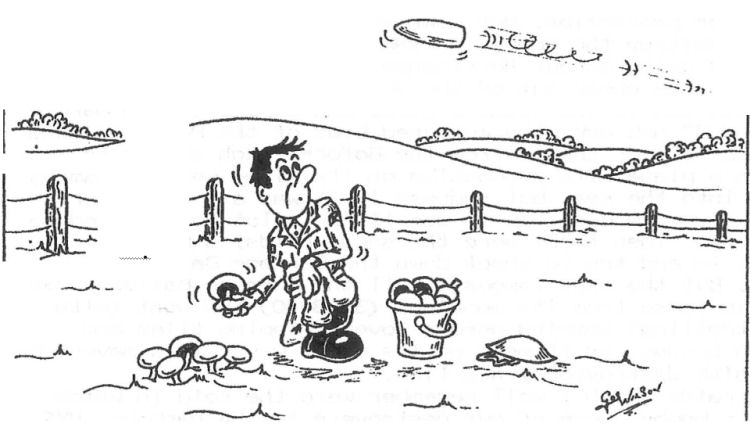
But it was not to be, out of the blue skies would swoop the German
Bombers, mostly Dive-bombers, seeking their targets. The convoys zinged
and sagged while the bombers attacked. But it was not always one sided,
The Navy, Heavy Anti-aircraft Guns, and Light Anti-aircraft gunners had
their successes. Bombers burst into flames, others with part of a wing,
tail or fuselage shot away plunged into the sea.
Even as planes are destroyed so our ships are sunk by the German
bombers. The ships carry vital supplies, food, oil, ammunition and other
vital supplies. And to see a oil tanker hit resulting in the merchant
sea men caught in the fire and drowned in a sea of oil is unforgettable.
Then without warning a silence steals over the area. The planes are
gone and the guns silent. In time the all clear sounds and its time for
me to complete my duty and visit the other gun sites for their reports.
A couple of days before my birthday there was a massive raid on a
convoy, wave after wave of Junkers 87's with an escort of M. E. 109's
tried to destroy a convoy. E-boats also joined in and 8 ships were sunk
and several more damaged, including 2 destroyers.
The day after my birthday July 29th saw another vicious attack, there
must have been 100 plus planes. Inside the harbour our old friend HMS
Codrington who had been with us in Norway was sunk.
After furious days of action it was a relief to call in the Regent
and hear the words ‘Kiss me Taffy' and enjoy a 2 pints and 2 bob change.
I can recall the night when Kath the daughter got engaged, I stood on
the table swaying to the beer not the music and with Kath playing the
accordion, I sang Mexicali Rose. And we also slipped around the corner
into Snargate Street and visited the cockle shop. What nights.
Good fortune and tragedy walk hand in hand. I had been given a few
extra hours off so went to Dover early, promising to meet Len (my pal)
in the Regent about 8. I went to the Grand to have a chat with the
manager and his wife who I knew fairly well. Their first words were
"Have a drop of whisky, Taff and celebrate our move to Cornwall". He
explained that the constant bombing was affecting his wife's nerves.
Therefore they were moving. Later I went to the Regent to meet Len and
take him to the Grand to away farewell to our friends. Just back at the
Regent the sirens went, so we stayed put. There was a terrific explosion
which I think shook every building in Dover. After the all clear we made
our way to the Grand, but the Grand was a wreck, just burning rubble
with firemen fighting against the odds to rescue people. Len and I as
did every other serviceman in the vicinity offered to help, but were
turned away, the situation being hopeless. We returned to the Regent
where for a short time the topic was the Grand. The music of Kath helped
to dispel some of the gloom, and for Len and I, 2 Pints?
Life must go on, and life does go on. In a very short time I have
learned, life is for living, live for today, there may be no tomorrow.
The summer of 1940 seemed to be one of long bright sunny days, but I
suppose my memory has shut out the rainy days. I was fascinated by the
Hurricanes and Spitfire pilots who battled so bravely against all odds.
They weaved and zoomed around the skies taking the fight to the Germans
and winning it. M.E. 109's came in on sneak raids shooting down the
barrage balloons. However we claimed one balloon that summer. A rogue
balloon had broken from its moorings and with its cable trailing went
drifting across Dover ripping chimney pots and Slates from houses. So we
had to shoot it down.
On another occasion a German pilot was parachuting down and I was
determined to capture him and have his flying boots. I strapped on my
revolver, jumped on the bike and followed his decent across fields and
roads. But he came down in the Marine Camp, so my efforts were for
nothing.
Again years later at a re-union dinner the story had grown. It was
said that "I captured the pilot, took his Iron Cross of him and never
gave it back".
The cook on a site on the cliffs was taken ill. So they had no cook
one of our drivers volunteered to do the cooking. And to create a good
impression done the gunners a meat pie. At meal time he called out 'come
and get it', the lads lined up with their mess tins, but Trig couldn't
cut through the pastry, he couldn't even dent it with a 7lb hammer and
legend has it that Trigs meat pie was used for door mat, and three weeks
went by before there were any cracks or signs of wear and tear in the
pie.
"The toughness of the pie is not true but we pulled Trigs leg, and
the story grew".
Again at a Re-union I repeated this story, only to be shouted at by a
pal, 'That wasn't Trig. I cooked that pie'!! No body was taking away the
credit for his meat pie.
With so many raids happening, and our guns being in action day and
night, ammo was quickly used up and a few times I had to take a convoy
of trucks to ammo dumps and load up with shells. It was a bit hairy
riding gunshot to a convoy of ammo. Knowing that any time you were near
or in Dover you could be in the middle of an air-raid. On another
occasion I had to take some guns to Hawkinge air-field, and sure enough
a M.E.109 sneaked in and dropped a stick of bombs, which fortunately
missed the convoy. But the blast, or was it fright knocked me off my
bike. No time to worry, or hang about, Hawkinge needed those guns.
Battery Headquarters and Troop Headquarters moved into 2 bungalows in
a dell behind the castle. The bungalows were ‘Marne and Bradlees. At the
top of the hill was a barracks where Auxiliary Territorial Service
(woman) were billeted. Sadly during a raid the barracks got hit and
17(??) girls were killed; can't trust my memory on this occasion.
The threat of invasion was growing and the order came for us to get
our transport from the bus depot and keep it near our guns. Whether this
was to be able to fall back with the guns, or go forward if the enemy
came nobody told us. On second thoughts we could not go forward, we were
already on the cliff tops. We also had to start all vehicles and run the
engines for 10 minutes every hour. Eventually this was cancelled, and as
August gave way to September the Royal Air Force, who had so bravely
battled against great odds, convinced Hitler that his invasion plans
would have to be postponed or even cancelled for all time.
Some say that an invasion force did leave France. There were tales of
German bodies being washed up on the beaches as far away as Cornwall's
sailor who came into the Regent and was a friend, told me that while on
early morning patrol on his mine-sweeper, and just outside the
breakwater there were hundreds of German bodies being swept away on the
sea. Another pal of mine, Arthur, who was on the breakwater at the
entrance to the harbour the same morning, confirmed this story. He and
the gun crew had seen German bodies sweeping past. Many people believed
the story to be true but there was never any confirmation. There were
unofficial explanations and rumours. First, the invasion was tried, but
the Royal Air Force shot the barges up as they left the French coast.
Secondly, the Germans were on invasion maneuvers when again the Royal
Air Force caught and bombed them. It was also said the Royal Air Force
dropped fuel (high octane) on the sea and barges and set fire to them,
causing great destruction.
Did the Germans try to invade us? Did the Royal Air Force catch, bomb
and burn them?? The stories were told by men who were in Dover at the
time when the threat of invasion was never greater. But there was never
any official comment from the higher echelons, and morale had to be
sustained.
The Battle of Britain began officially on July 10th 1940 and finished
October 31st 1940.
My Regiment 55th Light Anti-aircraft Regiment, Royal Artillery
had seen it through from beginning to end. In fact our stay in Dover and
the air-fields of Kent stretched from early July 1940 to February 1941.
Perhaps its time for the Regiment to take a break. We had been
subjected to continued bombing in Norway where night brought no relief;
it was the time of the 'midnight sun.'
Now for 7 months we were again in the front line at Dover, sharing
the bombing and shelling with the courageous people of the town. Dover
as expected showed signs of wear and tear. Piles of rubble where
buildings had previously stood. The shell of a church or chapel, stark
reminders of the battle. Everywhere you could find shell holes and bomb
craters that had been filled in. Along the cliff tops were buildings
riddled by cannon-shells from attacking German aircraft as they tried to
wipe out our gun crews.
On our last evening in Dover, Len and I went to the Regent to say our
goodbyes. What a night, tinged with regret also relief. So we left that
great bastion, the symbol of all that was British.
Optimistically, I thought where-ever I went, there would be a barmaid
waiting who would shout 'kiss me Taffy' but more important let me have
'2 pints and 2 bob change'.
By Edward Cogdell. 30/Dec/2007.
A brief composition of our Regiment. It was the 55th Light
Anti-aircraft Regiment. It consisted of 3 Batterys - 163-164-165 all
Light Anti-aircraft. The 3 Battery's between them were deployed at most
of the airfields around Dover, Deal and Folkestone. My Battery being 163
was deployed around Dover and St. Margaret's, at one time having a
gun inside the castle grounds.
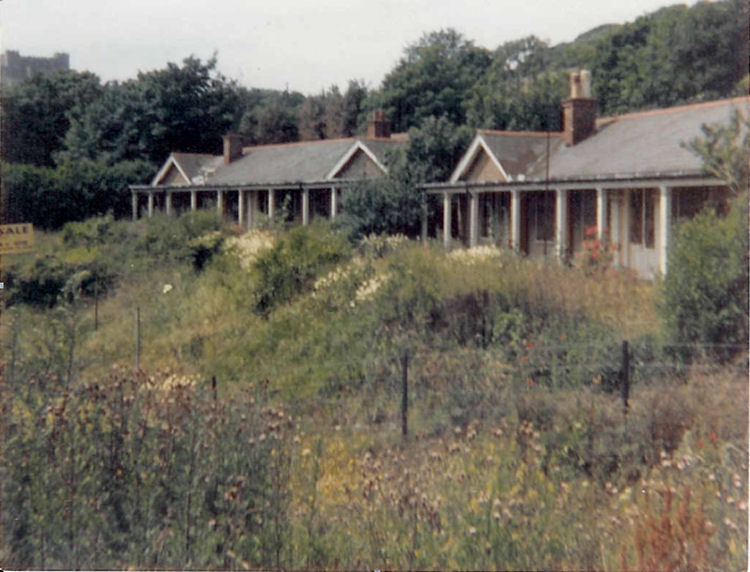
At the end of the garden of Broadlees was a football pitch, where
in-between raids we had a kick about. But the new dock road was built
over the football pitch. Talking to you is reviving so many memories of
Dover, times and pals; many of the pals have long passed on. In fact I
am only in touch with six from those days of 1939/40.
|
|
From the Dover Mercury, 23 February 2006.
Merry memories of Market Square.
THE article on the exhibition detailing the history of Dover Market
Square in the Mercury last month proved very interesting to reader Joan
Wheatley, of Beaconsfield Avenue.
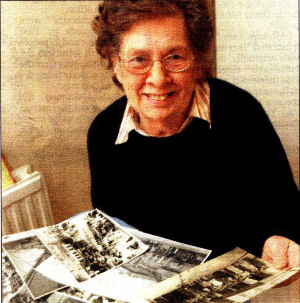 Her
sister, Kay Grove took four shops and the bays opposite in the Market
Hall soon after the Second World War and Joan also worked with her. Her
sister, Kay Grove took four shops and the bays opposite in the Market
Hall soon after the Second World War and Joan also worked with her.
"We started off with second-hand clothing which was on the racks in the
bays," she said.
"When it rained, we had to bring all the items into the shops because at
that time the roof had been blown off by the shelling and had not been
replaced.
"Later on, when clothing came off coupons, we sold men's new clothing
and then went on to furniture, new hats and jewellery, brass-ware and
antiques.
"The Market Hall was a favourite shopping area for Dover people with the
large variety of shops. Hiltons the butcher and grocer later became
Wilson's fish shop. There was also Hammonds and Hearn's greengrocers, a
wool shop, baby-wear shop and a shoe repairer, Charley Orme's cafe at
the entrance and many others.
"Everyone had a thriving business until it was forced to close - a sad
day for everyone."
Joan was also interested to see the reference to inns in our Those Were
The Days feature, as her parents, Dot and Fred Moody, were licensees of
the Prince Regent from 1934.
"When my father died my mother took over the licence and was there until
she retired in 1971.
"The brewers could not date the property but I remember that every door
in the living quarters had a sliding peep hole, so were they there to
keep the shady occupants in order many years ago when it was called the
Regent or Regent Tap? I have often wondered."
|
|
From the Dover Express. September
2011.
25 YEARS AGO
DOVER Market Square was shrouded in dense black smoke after a fire broke
out at the old Prince Regent pub.
Two policemen braved falling debris from burning roof timbers to rescue
three men, believed to be squatters, from inside the building.
Constables Bruce Smyth and Don Bacon were on patrol duty in the Market
Square area when they saw smoke escaping from the roof.
The officers forced their way in and saw two men trying to get out. On
the second floor, they found another man.
Firefighters wearing breathing apparatus searched the building to check
there was no one else inside.
They were unable to prevent the second floor and roof from being
completely destroyed.
|
|
From an email received 21 February 2012
I am in touch with a lady in
Tunbridge Wells whose late husband served in The Buffs regiment from
1953-1956. While sorting through his effects she found this small card
relating to the "Prince Regent" pub in Market Square Dover.
Is it some sort of I.D. or membership card issued by the pub in the
mid 1950's? we would be interested in your comments.
If it helps, I do know that Ted was stationed at Old Park Barracks
Dover from December 1954 until June 1955.
Kind regards Fred Scales ( ex The Buffs 1955-1957)
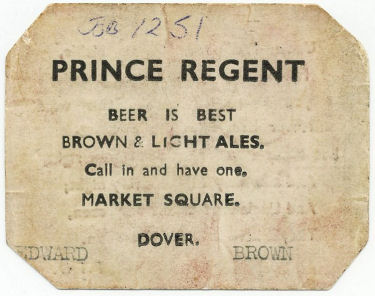 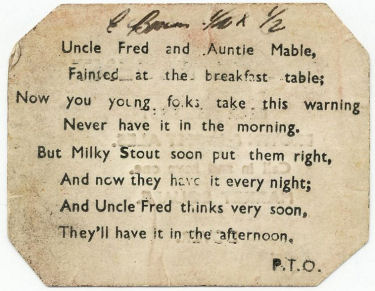
If anyone has any ideas about this, please email me at the address at
the bottom of the page. |
It was destined to close in 1974-75 and arrangements had been made to
erect a replacement at the juncture of Queen Street and the new York Street.
That scheme fell by the wayside when the old building was declared to be of
architectural interest. The name of the new pub had been suggested as
Captain Webb after the first channel swimmer, the opening being visualised
in August 1975.
With that cancelled, it continued to retail for a few more years, closing
finally in mid April 1983. Its demolition was sanctioned by the local
authority in October 1983 but it was still standing in 1986 when the upper
floors were damaged and the roof destroyed by fire on 23 September that
year.
Perhaps appertaining to the name, the Prince Regent did make regular
visits to the town after 1815 in order to receive allied sovereigns and
heads of state, He was also here when Louis XVIII returned to France from
exile on 23 April 1814.
The area did eventually see redevelopment in 1989. The pub was taken down
as a consequence, in February that year. "Captain Webb" did make its debut
but not in the original position planned. The lane was closed from 4 April
1989.
LICENSEE LIST
THOMPSON Edward 1823-39+
   
BROCKMAN John 1833-41+ (age 45 in 1841 ) )

OAKENFULL Henry 1847

GOSSIP William 1850

LONGLEY John 1851+ (age 47 in 1851 )
(Regent) )
(Regent)
PETTS Thomas Edward 1864-Jan/68
 (Regent) (Regent)
LONGLEY John Newman Jan/1868-82+
 (age 38 in 1871 (age 38 in 1871 ) )
   (Regent)
(Regent)
 YOUNG George Charles 1884-Sept/85
YOUNG George Charles 1884-Sept/85

HOPPER T Sept/1885+
 (of
Hammersmith) (of
Hammersmith)
LOGAN William to Jan/1888 dec'd

LOGAN Rosamond Butler (widow) Jan/1888+

 DOBLE William Henry 1891-Aug/1901 (age 45 in 1891
DOBLE William Henry 1891-Aug/1901 (age 45 in 1891 ) )
   
WATSON James Henry Aug/1901-Apr/04
  
 DOLBEAR W James Apr/1904-05
DOLBEAR W James Apr/1904-05


HAYWOOD J 1906
GORLEY Frank Clark 1907-Mar/08
 
 WALLACE Charles Mar/1908-11 end
WALLACE Charles Mar/1908-11 end

WARNER Walter Bridgeford 1911-Mar/14
 
 WEBB Mr James B Mar-May/1914
WEBB Mr James B Mar-May/1914
 (After
pub in Sellinge he had been in Canada) (After
pub in Sellinge he had been in Canada)
HILLIER Ernest May/1914-17 ( of White Horse, Bishops Stortford)
of White Horse, Bishops Stortford)
WHITING Mr H W to Aug/1917
 temporary
license temporary
license
WOOD George John Arthur
 Aug/1917-30/Dec/20
Aug/1917-30/Dec/20
 miner
from Lydden miner
from Lydden
 COE George 30/Dec/1920-Mar/22
COE George 30/Dec/1920-Mar/22
 
 JONES Charles Thorne Mar/1922-24
JONES Charles Thorne Mar/1922-24
 
DEPROSE WaIter G to Aug/1924

WRIGHT Charles Aug/1924-28 end

HAZELL Percy Robert 1928-Dec/30
 
 WYLE Philip
W Dec/1930-Oct/31 WYLE Philip
W Dec/1930-Oct/31


CALVERT Ernest Thomas Oct/1931-34
 
 (Sub-postmaster, of Ramsgate)
(Sub-postmaster, of Ramsgate)
 MOODY Frederick 1934-Oct/1940
MOODY Frederick 1934-Oct/1940
  
CLINCH Ernest William Oct/1940-Oct/41 (Secretary to Gardener & Co)

MOODY Frederick Oct/1941-56+
    
MOODY Doris 1964-71 end
ORGAN Anthony M (also "Primrose")
& ELLIS C A 1974
 Gardner & Co
Gardner & Co
McDEVITT M J M 1975
CHANTLER G H 1977
McNELLY C 1977-78
HAY P 1978
BALSOM J 1979-80 end

JONES John 1980
CURRY William 1981-83 end
WILKINSON E 1983
 From the Pigot's Directory 1823 From the Pigot's Directory 1823
 From the Pigot's Directory 1828-9 From the Pigot's Directory 1828-9
 From the Pigot's Directory 1832-33-34 From the Pigot's Directory 1832-33-34
 From the Pigot's Directory 1839 From the Pigot's Directory 1839
 From the Pigot's Directory 1840 From the Pigot's Directory 1840
 From Bagshaw Directory 1847 From Bagshaw Directory 1847
 From
the Post Office Directory 1874 From
the Post Office Directory 1874
 From
the Post Office Directory 1882 From
the Post Office Directory 1882
 From Pikes Dover Blue Book 1895 From Pikes Dover Blue Book 1895
 From the Kelly's Directory 1899 From the Kelly's Directory 1899
 From the Post Office Directory 1901 From the Post Office Directory 1901
 From the Post Office Directory 1903 From the Post Office Directory 1903
 From the Kelly's Directory 1903 From the Kelly's Directory 1903
 From Pikes Dover Blue Book 1909 From Pikes Dover Blue Book 1909
 From the Post Office Directory 1913 From the Post Office Directory 1913
 From the Post Office Directory 1922 From the Post Office Directory 1922
 From Pikes Dover Blue Book 1924 From Pikes Dover Blue Book 1924
 From the Post Office Directory 1930 From the Post Office Directory 1930
 From Pikes Dover Blue Book 1932-33 From Pikes Dover Blue Book 1932-33
 From the Post Office Directory 1938 From the Post Office Directory 1938
 From Pikes Dover Blue Book 1938-39 From Pikes Dover Blue Book 1938-39
 From Pikes Dover Blue Book 1948-49 From Pikes Dover Blue Book 1948-49
 From the Kelly's Directory 1950 From the Kelly's Directory 1950
 From the Kelly's Directory 1953 From the Kelly's Directory 1953
 From the Kelly's Directory 1956 From the Kelly's Directory 1956
 From the Dover Express From the Dover Express
 From the Dover Telegraph From the Dover Telegraph
 Census Census
|
























 Her
sister, Kay Grove took four shops and the bays opposite in the Market
Hall soon after the Second World War and Joan also worked with her.
Her
sister, Kay Grove took four shops and the bays opposite in the Market
Hall soon after the Second World War and Joan also worked with her.
